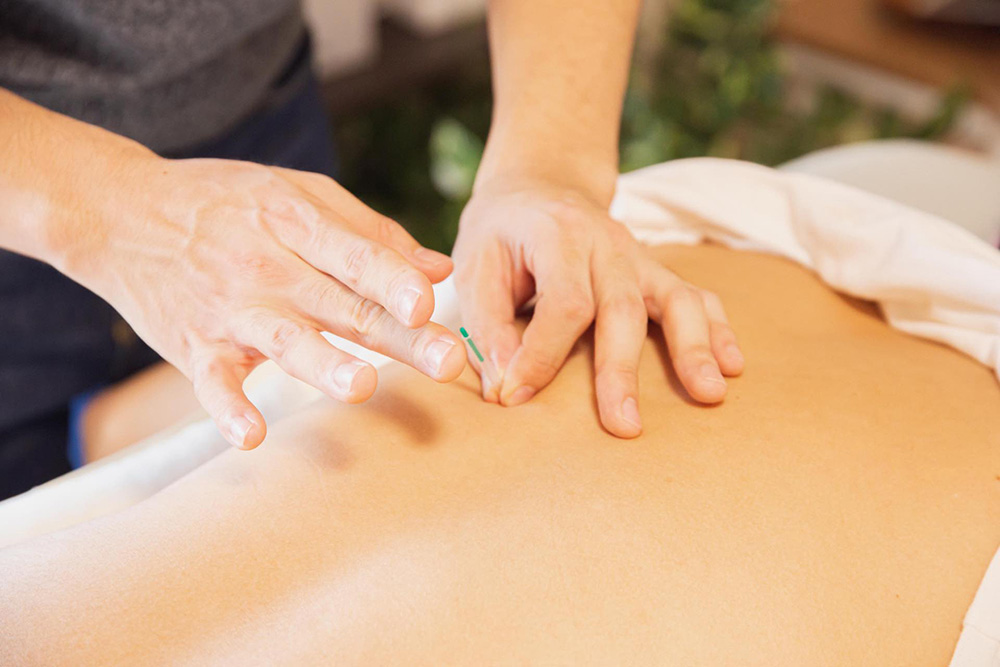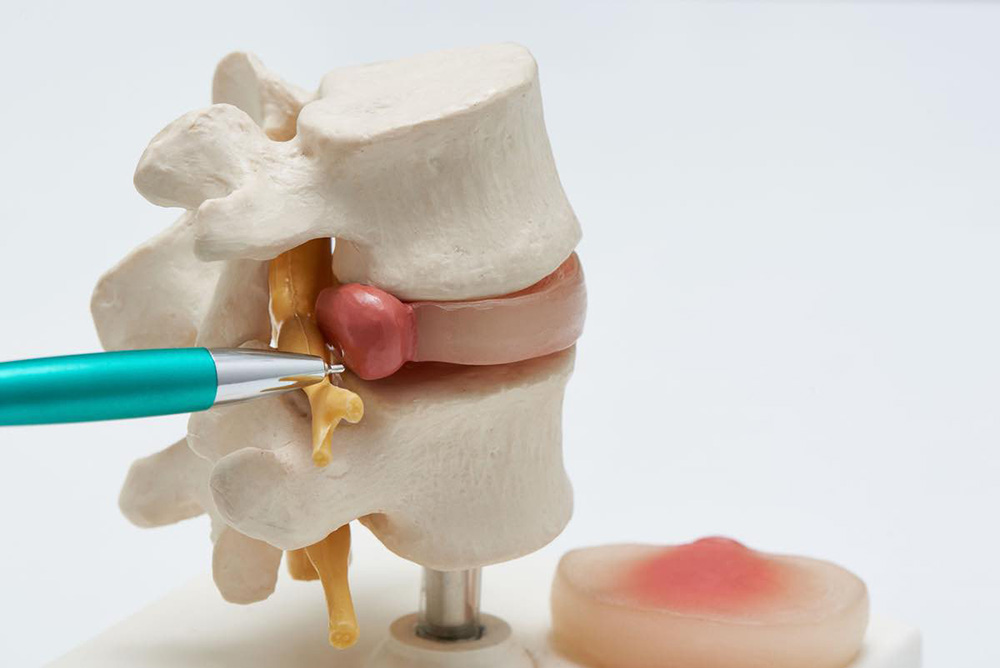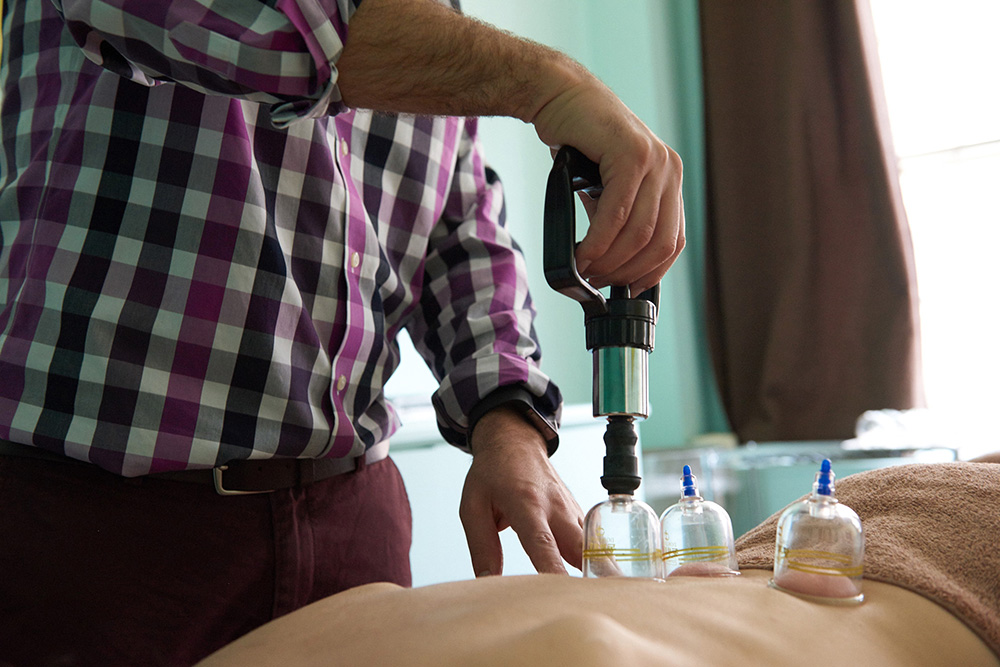Lumbar Disc Herniation
Acupuncture is a natural treatment for a lumbar herniated discs that works by stimulating the body to release natural painkillers, reduce inflammation, and improve circulation. In this way, it targets the root causes of the condition allowing the body to heal itself.
Many research studies have shown acupuncture to be effective in treating lumbar herniated discs, in many cases, it is better than steroid injections. Also, acupuncture treatment reduced the chance of having surgery (1).

Throughout my years of clinical experience, I have helped many patients with lumbar disc herniations reduce pain as well as avoid more invasive procedures such as epidural steroid injections or surgery. When acupuncture is used to stop the pain and reduce inflammation this provides an opportunity for the body to heal itself. I have found the correct combination of acupuncture, electroacupuncture, and cupping will provide profound improvement and relief for patients with lumbar disc herniations.
In this article, I will tell you how acupuncture works to treat herniated discs, share clinical research that proves it works, and share how we create personalized acupuncture treatments to relieve your back pain and disc herniation.
What is a Herniated Lumbar Disc?
In the back, the spinal discs are rubbery cushions that sit between your spinal bones, called vertebrae. These bones and cushions stack to form your spine. The spinal disk is composed of a soft, jelly-like core (nucleus), and a harder, more rubbery outer (annulus).
A herniated disc is a condition in which a piece of the inner core of the disc bulges through a tear in the outer ring. This can press on a spinal cord or nerve root causing sciatica pain down the leg or if it is in the neck, down the arm.
A herniated disk is also known as a slipped disc or ruptured disc.

The spinal discs can herniate anywhere along the spine. But the lower back is the most common place to experience a herniated disc. This is called the lumbar region of the back and the injury is called a lumbar disc herniation. It can cause pain, numbness or weakness in one arm or leg depending on the location of the herniated disc.
A herniated disc can be caused by many factors. The disc may become weak with age or excessive weight. The discs can become injured because of repetitive movements, excess sitting, or lifting something heavy. The injury is often characterized by a sharp pain in the low back or sciatica. Inflammation in the nerve area can also cause pain and numbness.
Lumbar strain or piriformis syndrome can also irritate the spinal nerves. Often patients with herniated lumbar discs will also have back pain.
In many cases, a herniated lumbar disk will improve on its own or the with help of safe interventions such as acupuncture. In these cases, acupuncture works to reduce pain and stimulate the healing process to provide time for the body to heal. It can be used with physical therapy that works to strengthen your lower back muscles.
How does Acupuncture Treat Lumbar Herniated Disc?
Acupuncture is a powerful natural treatment to alleviate the pain, stiffness, and inflammation caused by a herniated disc. It is a safe, non-invasive therapy that stimulates healing by
- increasing blood flow to the area
- prompting the body to release natural pain killers such as endorphins, endogenous opioids, and other natural pain relievers (2)
- Stimulates the parasympathetic nervous system, which is helpful for reducing the inflammatory cascade
- Reduces inflammation and relieves stiffness
- promoting the spontaneous reabsorption of a lumbar herniated disc (3)
The pain relief of acupuncture treatment often can be felt right away.
In acupuncture, the body is connected by channels. In these channels, Qi, the body’s essential energy, and blood flow. Injury causes the qi and blood to slow down and get stuck or stagnate. Acupuncture removes these impediments, bringing balance and circulation back to the muscles, and allows the body to heal on it’s own. Improving the circulation of qi promotes better health and overall physical well-being.
According to Chinese medicine, the kidneys are closely associated with the lumbar region. This region is considered the house of the kidneys. Lumbar disc herniation can cause the muscles to become tight and reactive, and cause the back to be painful. Wind, damp, and cold can also cause the channels in the lumbar region to tighten up resulting in the irregular circulation of blood and Qi. Additionally,lack of Qi in the body, called Qi vacuity, can lead to this condition.
Kidney Qi deficiency can also lead to cold extremities, weak knees, and fatigue. To treat kidney Qi deficiency, acupuncture points UB 52 and UB Tai Yang may be added to the acupuncture treatment. These points are important in balancing Qi and blood flow in the kidneys.Qi vacuity may also occur as one age. The therapies for this would include acupuncture to boost and warm the kidney Qi.
Treatment
Throughout my years of experience, I have treated many people with acupuncture for herniated discs. During the initial visit, I will review your medical history and perform a physical exam. Factors in how I approach the treatment will be related to when the herniation occured, what the current pain levels and symptoms are, previous injuries, and triggers for the pain and discomfort.
My customized treatment plan may include acupuncture, electroacupuncture, and cupping.
Electroacupuncture is very similar to regular acupuncture, but it also includes electrical stimulation of acupuncture needles. It is said to promote qi circulation, remove blood stasis, and dispel wind-dampness in the affected areas. Additionally, electroacupuncture enhances the anti-inflammatory and pain-relieving mechanisms of the treatment.(4) Electroacupuncture is a very relaxing and comfortable treatment.
The position in which you receive acupuncture is important during the acute phase of treating a herniated disc. It is often more effective, and more comfortable, for patients to lie on their side during the acupuncture session as this has a great effect of relaxing the back muscles.
Another consideration is the length of time of the acupuncture treatment. For acute disc herniation shorter treatments of about 18-22 minutes are more effective. As the body heals, the treatment can be extended to 22-25 minutes.
During the acute phase of a disc herniation, it is helpful to get acupuncture two-three times per week for the strongest pain relief and most rapid course of healing. Often, pain is significantly reduced after only a few weeks. A treatment course generally consists of 8-12 visits. Some patients will see faster relief and can stop soon while others may require more visits.
Acupuncture Research
Many studies have shown acupuncture to be effective in treating lumbar disc herniation. A recent meta-analysis, which is a study that combines the results of many randomized controlled trials, totaling 3503 patients, showed that acupuncture was more effective for lumbar herniated discs than traction or steroid injections. (1) The study also noted that acupuncture decreased the likelihood of undergoing surgery. In fact, some patients were able to cancel their scheduled back surgeries after receiving acupuncture. Many case studies have shown that acupuncture helps with the spontanious reabsorption of herniated discs.

Cupping Heals Lumbar Disc Herniation
Cupping is one of the Chinese medicine therapies for treating lumbar disc herniation that can reduce pain and facilitate healing. It was developed about 1000 BC and has been proven to improve circulation and immune function without the side effects of pharmaceutical medications.
Cupping is a treatment that uses suction to gently lift the muscles and connective tissue. It is not painful but it generally will cause round bruises that stay for 7-14 days. Cupping may use rubber pumps with plastic cups or glass cups warmed with a flame to create the suction.
Cupping can help relieve back pain and muscle tension. It also helps release fascial adhesions and increases blood flow to an area. This helps the muscles relax and reduce inflammation causing pain allowing the body to heal.
The negative pressure from cupping draws stagnant fluids up, flushing them out. The vacuum created by cupping draws stagnant blood and cellular waste to the surface, allowing new healthy blood to circulate. Fresh blood cells bring nutrients to the area and help in the clean-up process.
In conclusion, acupuncture and cupping therapy have proven to be highly effective in the management and healing of herniated discs. These therapies reduce inflammation, relax muscles, and increase circulation to decrease pain and promote healing. As a result, you will experience reduced pain, increased mobility, and a significant improvement in your overall quality of life. Clinical experience as well as modern research show that acupuncture is a safe and effective treatment for herniated discs. Call us today at 212-319-5757 or click below to make an appointment online.
Feel Better, Get Acupuncture!
- Tang, S., Mo, Z., & Zhang, R. (2018). Acupuncture for lumbar disc herniation: a systematic review and meta-analysis. Acupunct Med, 36(2), 62-70. doi:10.1136/acupmed-2016-011332
- Chen, T., Zhang, W. W., Chu, Y. X., & Wang, Y. Q. (2020). Acupuncture for Pain Management: Molecular Mechanisms of Action. Am J Chin Med, 48(4), 793-811. doi:10.1142/S0192415X20500408
- Li, B., Hu, H., Gao, H., Di, Z., Zhang, Q., & Fang, J. (2021). Electroacupuncture Might Promote the Spontaneous Resorption of Lumbar Disc Herniation: A Case Report. Complement Med Res, 28(2), 169-174. doi:10.1159/000509336
- Li, Y., Yang, M., Wu, F., Cheng, K., Chen, H., Shen, X., & Lao, L. (2019). Mechanism of electroacupuncture on inflammatory pain: neural-immune-endocrine interactions. J Tradit Chin Med, 39(5), 740-749. Retrieved from https://www.ncbi.nlm.nih.gov/pubmed/32186125
Feedback From our clients…
“I came to Dr. Alban after herniating a disc in my lower back. I had sciatic pain going down my legs into my foot. It hurt every time I sat down. I could not sit to drive, watch a movie, or even eat at the table with my family. During the first visit, he made me feel at ease about the treatment and that it was possible to recover without steroid shots and surgery. After a few visits of acupuncture and cupping the intensity started to reduce. Gradually, I got better, and I was able to resume normal activities without pain and discomfort. And I did not need to get steroid shots or surgery. I would recommend Dr. Alban without hesitation.”
~ P.Y., New York City